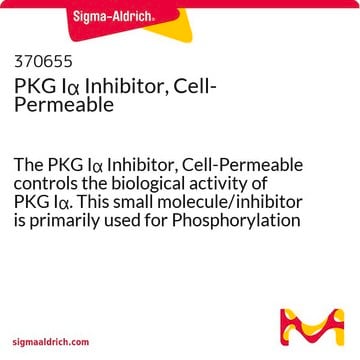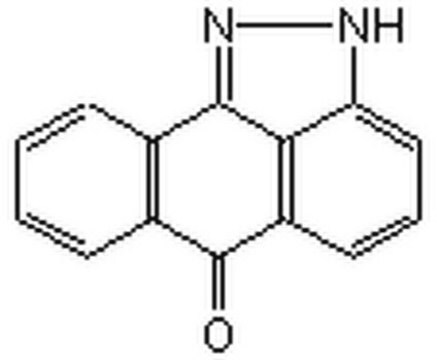370654
PKG Inhibitor
The PKG Inhibitor controls the biological activity of PKG. This small molecule/inhibitor is primarily used for Phosphorylation & Dephosphorylation applications.
Synonym(s):
PKG Inhibitor, Protein Kinase G Inhibitor, RKRARKE
Sign Into View Organizational & Contract Pricing
All Photos(1)
About This Item
Empirical Formula (Hill Notation):
C38H74N18O10
Molecular Weight:
943.11
UNSPSC Code:
12352200
NACRES:
NA.77
Recommended Products
Quality Level
Assay
≥95% (HPLC)
form
lyophilized
manufacturer/tradename
Calbiochem®
storage condition
OK to freeze
desiccated (hygroscopic)
solubility
water: 1 mg/mL
shipped in
ambient
storage temp.
−20°C
General description
A more specific, reversible, and substrate competitive inhibitor of protein kinase G (Ki = 86 µM) relative to protein kinase A (Ki = 550 µM). Sequence corresponds to a non-phosphorylatable analog (Ser32 to Ala32) of histone H2B (amino acids 29-35).
A specific, reversible, and substrate competitive inhibitor of PKG (Ki = 86 µM) relative to PKA (Ki = 550 µM). Sequence corresponds to a non-phosphorylatable analog (Ser32 to Ala32) of histone H2B (amino acids 29-35).
Biochem/physiol Actions
Cell permeable: no
Product does not compete with ATP.
Reversible: yes
Target Ki: 86 µM against protein kinase G
Packaging
Yes
Warning
Toxicity: Standard Handling (A)
Sequence
H-Arg-Lys-Arg-Ala-Arg-Lys-Glu-OH
Other Notes
Glass, D.B., et al. 1983. Biochem. J.213, 159.
Legal Information
CALBIOCHEM is a registered trademark of Merck KGaA, Darmstadt, Germany
Storage Class Code
11 - Combustible Solids
WGK
WGK 3
Flash Point(F)
Not applicable
Flash Point(C)
Not applicable
Certificates of Analysis (COA)
Search for Certificates of Analysis (COA) by entering the products Lot/Batch Number. Lot and Batch Numbers can be found on a product’s label following the words ‘Lot’ or ‘Batch’.
Already Own This Product?
Find documentation for the products that you have recently purchased in the Document Library.
Karen G Wong et al.
Science advances, 10(11), eadm9518-eadm9518 (2024-03-13)
Extracellular signals are transmitted through kinase cascades to modulate gene expression, but it remains unclear how epigenetic changes regulate this response. Here, we provide evidence that growth factor-stimulated changes in the transcript levels of many responsive genes are accompanied by
Debarati Mukherjee et al.
Cancer research, 83(17), 2889-2907 (2023-06-19)
Triple-negative breast cancers (TNBC) tend to become invasive and metastatic at early stages in their development. Despite some treatment successes in early-stage localized TNBC, the rate of distant recurrence remains high, and long-term survival outcomes remain poor. In a search
Our team of scientists has experience in all areas of research including Life Science, Material Science, Chemical Synthesis, Chromatography, Analytical and many others.
Contact Technical Service








